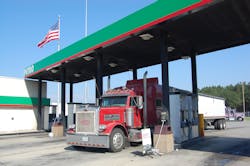Improving fuel economy is an ongoing process. Whether you start at 6, 7, 8, 9 MPG or even 10 MPG there is always room to find a way to get a bit more mileage out of a gallon of fuel.
The first step, of course, is to know where you’re at both on a truck-by-truck basis and fleet-wide. The good news is that with today’s advanced technologies it is relatively easy to find the data you need to establish a fuel economy baseline.
Once you know where you’re at, set a realistic goal of where you want to get. If you’re one of the fleets that is at 7 MPG thinking you can get to 10 MPG overnight just isn’t realistic unless you replace your entire fleet. Setting realistic, manageable goals helps ensure success.
Once you’ve set your goal, determine what it will take for you to reach it. Our Confidence Reports provide an unbiased look at some of the currently available technologies that will help improve fuel economy and are a good starting point in your search of which technologies make the most sense for your operation. And don’t forget operational practices like driver training, limiting speed, reducing empty miles, route optimization, lightweighting, preventive maintenance, etc. Talk to your truck and trailer makers, component suppliers and dealers to get input from them. And see what other fleets are doing that might work for you.
After you’ve made the necessary investments continue to monitor the performance of your trucks and spend time analyzing the data you get looking for trends and anomalies. Make adjustments as needed. Sometimes a change can be something as simple as modifying an engine parameter. Other times it can be more complicated and you may need to rethink a technology or adapt it to your specific operating conditions.
Then repeat the cycle: monitor, analyze, adjust and improve. If you keep doing this, you should continue to see improvements in your MPG without breaking the bank. And manufactures – think like a fleet and help them along the way!
About the Author

Michael Roeth
Executive Director
Michael Roeth is the executive director of the North American Council for Freight Efficiency. He serves on the second National Academy of Sciences Committee on Technologies and Approaches for Reducing the Fuel Consumption of Medium and Heavy-Duty Vehicles and has held various positions with Navistar and Behr/Cummins.
